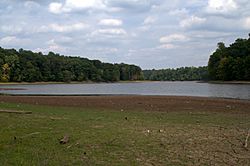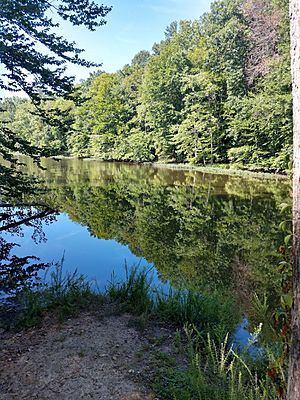Occoquan River facts for kids
Quick facts for kids Occoquan River |
|
|---|---|

Occoquan River near Fountainhead Regional Park
|
|
| Country | United States |
| State | Virginia |
| Physical characteristics | |
| River mouth | Potomac River 0 feet (0 m) |
| Length | 24.7 miles (39.8 km) |
| Basin features | |
| Basin size | 590 square miles (1,500 km2) |
The Occoquan River is a river in Northern Virginia. It flows into the Potomac River. This river forms part of the border between Fairfax and Prince William counties. It is a beautiful area, and many local high schools and colleges use the river for rowing competitions.
About the Occoquan River
The Occoquan River is about 24.7 miles (39.8 km) long. Its watershed, which is the area of land that drains water into the river, covers about 590 square miles (1,500 km²). The river starts where two smaller streams, Broad Run and Cedar Run, meet in Prince William County.
Another important stream, Bull Run, joins the Occoquan east of Manassas. Bull Run also marks the border between Prince William County and Loudoun and northern Fairfax counties. The Occoquan River eventually flows into the Potomac River at Belmont Bay. All the water from the Occoquan River eventually makes its way to the Chesapeake Bay. The name Occoquan comes from an old Algonquian word. It means "at the end of the water."
History of the River
Long ago, some geographers thought the Occoquan River could be a natural dividing line. They suggested it could separate the northern and southern parts of the United States.
An important crossing point on the Occoquan was called Wolf Run Shoals. This spot was used a lot in the 1700s and 1800s. People traveled across it between Alexandria and Richmond. Wolf Run Shoals had three small islands and a mill. Today, these are underwater because dams have raised the river's water level. The dams help control floods, provide drinking water, and used to make electricity.
For many years, from around 1900 to 1976, people often called it "Occoquan Creek." But a person named Rosemary Selecman worked hard to get it recognized as a "river" again, and she succeeded!
Dams and Reservoirs
The Occoquan River has three dams along its path. These dams create reservoirs, which are like large lakes that store water.
The first dam is near the town of Occoquan. This dam creates the Occoquan Reservoir. This reservoir is a very important source of drinking water for parts of Fairfax and Prince William counties. The Occoquan Reservoir stretches all the way from Occoquan to Bull Run.
Further upstream, there is another reservoir called Lake Jackson. The dam that forms Lake Jackson is located at Virginia State Route 234, near Dumfries Road. This dam used to produce electricity, but it hasn't done so for many years. It still holds back the water to form the lake.
There is a third dam even further up Broad Run. This dam creates Lake Manassas. Lake Manassas is the main water supply for the city of Manassas.
Parks and Recreation
The Occoquan River is a great place for outdoor activities, especially rowing!
Sandy Run Regional Park is located in Fairfax Station. It is on the northeastern part of the Occoquan Reservoir. This park is used only for rowing. Many high schools that are part of the Virginia Scholastic Rowing Association (VASRA) use this park for practice and competitions. Some of the schools that call this park home include Robinson Secondary School, W. T. Woodson High School, Thomas Jefferson High School for Science and Technology, James Madison High School, Fairfax High School, Oakton High School, West Springfield High School, Langley High School, J. E. B. Stuart High School, and South County Secondary School.
Fountainhead Regional Park is also in Fairfax Station. It is further upriver from Sandy Run Regional Park, past Bull Run. Lake Braddock Secondary School and Westfield High School, which are also VASRA members, use this park for rowing.
The Occoquan River is also surrounded by three parks managed by Northern Virginia Regional Park Authority. These parks are Bull Run, Occoquan, and Fountainhead. Besides rowing, you can enjoy other activities like horse riding, trail cycling, fishing, and boating. The Bull Run to Occoquan trail goes through all three parks, from the beginning of the river to its end. The Oxford Boathouse is home to rowing teams from Hylton High School, Potomac High School, Gar-Field High School, Forest Park High School, Woodbridge High School, and Colgan High School.
 | Madam C. J. Walker |
 | Janet Emerson Bashen |
 | Annie Turnbo Malone |
 | Maggie L. Walker |


